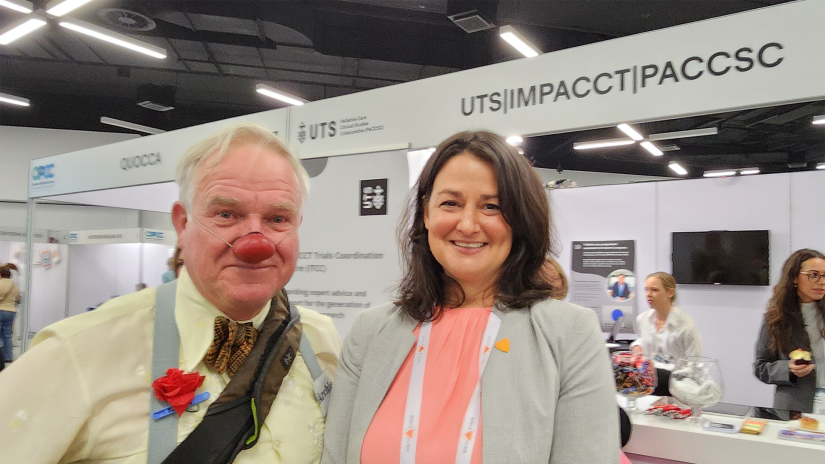Laughter Care is a type of humour therapy delivered by specialists within The Humour Foundation Australia to enhance the quality of life of older adults in residential aged care through connection, play, and humour.

Associate Professor Michelle DiGiacomo with Archie the Laughter Care Practitioner
Last week, Associate Professor Michelle DiGiacomo presented at the Oceanic Palliative Care Conference alongside Laughter Care Specialist ‘Archie’ from The Humour Foundation to discuss techniques used to engage people with dementia in residential aged care (RAC).
Effects of dementia
People with dementia living in RAC may increasingly experience social isolation, loneliness, and a loss of self along their disease trajectory. Further, behavioural and psychological symptoms of dementia are common and can include depression, agitation, anxiety, aggression, and delusions.
It is recommended that these unmet needs and symptoms are first treated using person-centred interventions before any medication is administered. There is a growing evidence base that demonstrates that Laughter Care can effectively reduce some of these behavioural and psychological symptoms.
Laughter Care study
At the conference, Michelle presented data collected through semi-structured interviews with experienced Laughter Care Specialists, which included topics on engagement techniques used when interacting with people with dementia. During the presentation, Michelle shared insights from the study and discussed how Laughter Care is a person-centred intervention that:
- values people with dementia for the person that they are now and in the past;
- provides opportunities for people with dementia to exercise agency, choice, and control (particularly important in RAC where residents have limited choice over daily activities);
- provides opportunities for people with dementia to contribute their knowledge and expertise in the form of advice giving or problem solving;
- creates a space where people with dementia can have fun, be joyful, and ‘have a laugh with a friend’, and
- builds a sense of community in RAC and encourages socialisation, which can continue once the specialist has left the facility.
Laughter care techniques

Archie, Laughter Care Practitioner
After a video where the audience could see Laughter Care in progress, Archie then described and demonstrated some techniques that he uses with people with dementia during his visits. He emphasised that at the core of every technique was the principle that it must be individualised – no two people are the same, therefore, attempts to engage must be tailored to the person. Examples of engagement techniques include:
- ‘yes and…’ technique – taking what the person has said and adding to the story rather than correcting them;
- park benching – sitting with the person, chatting about something relevant to the person, joining their activity;
- reminiscence – using objects, songs, and photographs to trigger memories and stories of the past; and
- using humour to bring some lightness and fun or to diffuse a situation.
Laughter Care is a person-centred intervention that can bring quality moments of life to people with dementia in aged care, providing them with a sense of joy and lightness through relationships and personal connection.
For more information about Laughter Care, visit humourfoundation.org.au/our-programs/.

Sara-Jane Roberts is a Research Assistant with a background in behavioural science. Sara-Jane’s research interests focus on improving the psychosocial wellbeing of vulnerable populations, which was shaped through her research endeavours within paediatric palliative care.

